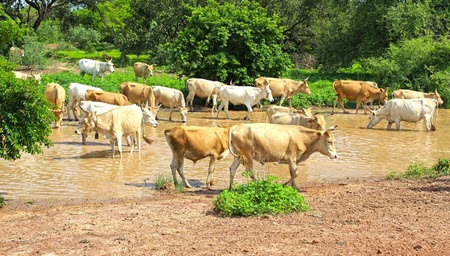Contents
The Republic of Gambia, commonly referred to as The Gambia or simply Gambia, is almost entirely surrounded by Senegal, except for a stretch of coast along the Atlantic Ocean. With its 10,689 square kilometres, it is the smallest country within mainland Africa.
The country derives its name from the Gambia River which bisects it. To facilitate trade, the Portuguese established a colony where the Gambia River reaches the sea, and called the area A Gâmbia. In 1765, it became a part of the British Empire instead, and would so remain under various legal labels until 1965 when the colonial era ended and The Gambia became an independent state within the Commonwealth of Nations.
Dawda Jawara ruled The Gambia from independence to 1994, when Yahya Jammeh seized power in a coup. In 2017, Adama Barrow became the elected president of The Gambia. Jammeh refused the accept the result of the election, and his refusal to step down prompted a military intervention by the Economic Community of West African States.
Economy of The Gambia
- Total GDP (PPP) $3.582 billion (2017 estimate)
- Total GDP (PPP) per capita $1,686 (2017 estimate)
- Nominal GDP $1.038 billion (2017 estimate)
- Nominal GDP per capita $488 (2017 estimate)
- Gini (2015) 35.9 (which is medium compared to the rest of the world)
- HDI (2015) 0.452 (which is low compared to the rest of the world)
Poverty
Data from 2015 showed that almost half of the population lived in poverty. The percentage of people living in poverty is significantly higher in rural areas than in urban ones.
Overview
 The Gambian economy is dominated by farming, fishing and tourism. A large chunk of the population rely on subsistence farming. Data from 2007 show that agriculture employed about 70% of the labour force, while accounting for less than a third of the gross domestic product (GDP). Services accounted for nearly 60 percent of GDP and industry for less than ten percent. The manufacturing industry that did exist was chiefly focused on processing agricultural products, e.g. processing peanut, baking and brewing. Other examples of manufacturing activities that existed in 2007 was soap production, soft drink production, and clothes production.
The Gambian economy is dominated by farming, fishing and tourism. A large chunk of the population rely on subsistence farming. Data from 2007 show that agriculture employed about 70% of the labour force, while accounting for less than a third of the gross domestic product (GDP). Services accounted for nearly 60 percent of GDP and industry for less than ten percent. The manufacturing industry that did exist was chiefly focused on processing agricultural products, e.g. processing peanut, baking and brewing. Other examples of manufacturing activities that existed in 2007 was soap production, soft drink production, and clothes production.
Traditionally, peanuts has been a very important cash-crop for Gambia. In 2007, peanut production accounted for slightly less than 7% of GDP, which might not sound much, but all other crops combined accounted for just 8.3% of GDP. Livestock made up about 5% and fishing less than 2%.
Export
The United Kingdom and certain other parts of Europe used to make up a huge part of the Gambian export market, but in the 21st century, Gambian products have also began to reach significant export markets in other parts of the world, especially the United States and Japan. Also, the neighbour Senegal has become a very important trading partner for Gambia – even more so than Guinea-Bissau and Ghana which used to be the most important African export markets for Gambian products.
Import
Examples of significant import countries for The Gambia are the United Kingdom, the Ivory Coast, China, the Netherlands, Denmark, the United States.
Re-export trade
Strategically located on the Atlantic ocean, Gambia has a flourishing re-export trade.
Gambia is known for its low import duties and minimal administrative procedures.
Currency
The Dalasi (GMD) has been the currency for The Gambia since 1971.
Banking
- The oldest bank in The Gambia is Standard Chartered Bank, which has its roots in the Bank of British West Africa (BBWA) of the late 19th century.
- The Swiss-based International Commercial Bank has four branches in The Gambia.
- Nigeria-based Access Bank has four branches in The Gambia.
- Prime Bank was opened in 2009 by the Lebanese Canadian Bank, but closed down in 2013 after being investigated by the U.S. Law enforcement and regulatory community.
Short facts
Area
10,689 km2
(of which 11.5% is water)
Population
1,857,181 at the 2013 census
About 2,050,000 at the 2017 estimation
Capital
Banjul
Independence
1965 (from the UK)
Government
Unitary presidential republic
Legislature
National Assembly of The Gambia
Official language
English
National languages
Mandinka
Fula
Wolof
Jola
Serer
Major ethnic groups (in 2003)
Mandinka
Fula
Wolof
Jola
Serahuli
Currency
Dalasi (GMD)
Timezone
UTC +0 (GMT)
Daylight Saving Time is not observed
Driving side
Right
Calling code
+220
Internet TLD
gm
ISO 3166 code
GM
This article was last updated on: February 13, 2019
